For more than a year, the world has been grappling with the first global pandemic of the 21st century. The rapid worldwide spread of the SARS-CoV-2 virus has led nations to implement a host of new policy measures to protect health, to strengthen health care systems, and to control within- and cross-border spread of the virus.
One particular set of measures that governments have used to control the pandemic within their borders is termed ‘social distancing’. Social distancing includes a range of policies designed to control the spread of the virus by limiting the contact that individuals have with one another, which can include measures such as bans on large social gatherings, stay-at-home orders, school and workplace closures, limiting unnecessary travel within and across regions, amongst others. While these measures are critical in reducing transmission of the virus, there may be unintended consequences for individual health and wellbeing that result from imposed social isolation. It has become increasingly clear that social distancing has had important impacts at both the individual and societal level that need to be weighed carefully by health authorities prior to and throughout their implementation.
Globally, there has been wide variation in the nature, timing, duration, and enforcement of social distancing policies within and across countries. As researchers, we have been particularly interested in how these varying policy responses to Covid-19 have impacted the lived experience of individuals. These issues are particularly important to examine in Latin America (LATAM), a region which has not only exhibited a range of policy responses, but has also been particularly hard hit by the pandemic.
Over the past year, we have been involved in the design and dissemination of an online survey aimed at understanding experiences and inequalities in outcomes associated with COVID-19-related social distancing policies. Our online survey includes both multiple choice and open-ended questions on a range of subjects – including questions aimed at understanding loneliness and subjective wellbeing during the pandemic, as well as questions capturing respondents’ views and perceptions regarding social distancing and social isolation policies. In this blog, we share our preliminary findings relating to the latter, and present results of a qualitative analysis of the free-text answers our LATAM respondents provided to the following question: What are your views regarding social distancing or self-isolation?
Respondents from 32 countries in LATAM (Figure 1) provided us with information on how social distancing and the pandemic has affected their daily lives.
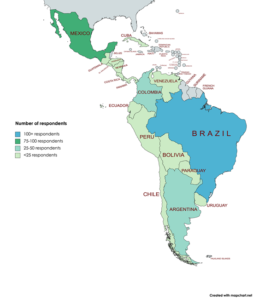 Figure 1. LATAM respondents’ self-reported country of residence
Figure 1. LATAM respondents’ self-reported country of residence
Below we present our preliminary findings from an analysis of 238 free-text responses capturing individuals’ perceptions of social distancing policies. Respondents provided answers in Spanish, Portuguese, and, less commonly, English. Responses were analysed in their original language and translated into English below. NVivo was used to aid with qualitative analysis and manage datasets.
Preliminary Findings
A majority of participants in our survey consider social distancing to be “important” and “necessary” in terms of its contribution to stopping the spread of the virus (Figure 2).
Figure 2. The 500 most frequently used words in response to the question, “What are your views regarding social distancing or self-isolation?”
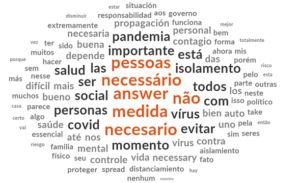
Note: Figure 2 (above) includes words from responses that were submitted in Spanish, Portuguese, and English, and excludes commonly occurring words (a, the, is, etc.) in each language.
However, despite the support for social distancing measures, there were also numerous mentions of the tolls that these measures were taking on individuals and societies. A hierarchy visualization was created using NVivo (Figure 3). This figure shows that, despite many reporting positive views of social distancing measures, the impact on mental health, the impact on personal income and national economies, and the sustainability of these policies were common concerns amongst respondents.
Figure 3. Key themes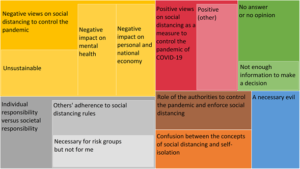
Importantly, some participants, in describing how their job requirements did not enable home working, highlighted their views that social distancing is “a privilege”.
“… que es un privilegio, la verdad no sé que otra solución hay para contener la pandemia”.
[… it is a privilege, I honestly do not know any other solution to contain the pandemic].
Male, 20, Mexico.
Mental health seems to be a key concern regarding social distancing measures among our respondents. Some acknowledged this while raising the concept of social distancing as being “a necessary evil”, which could mean that many participants feel social distancing is necessary in the context of the pandemic, but they are also aware of the high costs associated with it, particularly in terms of the toll on their mental health.
“Me parece bueno pero emocionalmente me afecta”.
[I think it is good, but it affects me emotionally].Female, 39, Chile.
“Necessario. Precisa ter muito equilibrio emocional”.
[Necessary. You need to have a lot of emotional balance.]
Male, 51, Brazil.
Despite the hardships that respondents in LATAM described, there was a notable appreciation for the necessity of these measures, with some describing that they balance their individual needs and desires with the need for adherence to social distancing measures for the collective good:
“Fundamental para o momento. É complicado, difícil, nada bom, mas muito importante pra controle e bem de todos.”
[Fundamental for the moment. It’s complicated, difficult, not good, but very important for the control and good of everyone.]
Male, 44, Brazil.
Limitations
While our sample is rich in terms of the range of participants from LATAM and the depth of qualitative and quantitative data we have from each, our sample is not a representative one. Of particular relevance here is the issue of selection bias. It is possible that the positive views of social-distancing as a containment measure against COVID-19 are over-represented in our sample, as those most concerned about COVID-19 control may have been more inclined to participate in our survey.
Conclusion
Prior to the pandemic, income inequality, informal employment and underfunded healthcare systems meant many LATAM nations were vulnerable to inequities in health and wellbeing. As in much of the world, the pandemic has exacerbated existing policy challenges and introduced new pressures at the individual and societal level; yet our findings suggest that our respondents remain largely supportive of social distancing policies. As the virus continues to spread through LATAM nations, it will be critical to contine to monitor the impacts on health and wellbeing.
This work was supported by a Covid-19 Solidarity Grant from the Atlantic Institute.
Rocio Nava is a PhD Candidate in Health Sciences at the University of York. Alex Janus is a Lecturer in Quantitative Methods and Sociology at the University of Edinburgh. Emily Adrion is a Lecturer in Global Health Policy at the University of Edinburgh. The authors would like to acknowledge Talulah Hall, a recent MSc Global Health Policy graduate from University of Edinburgh, who contributed to the wider research that informed this blog.
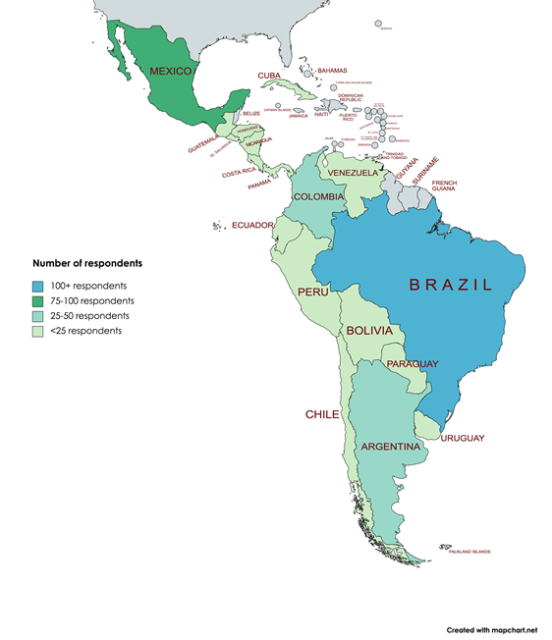
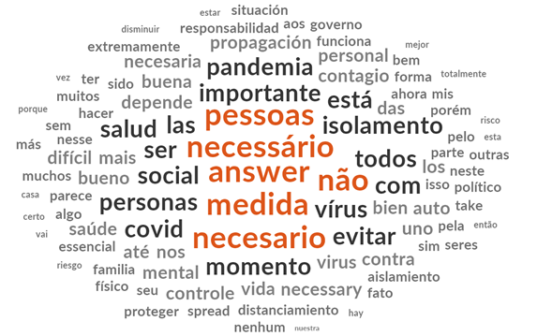
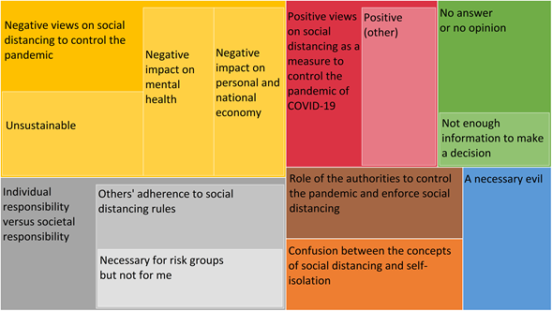
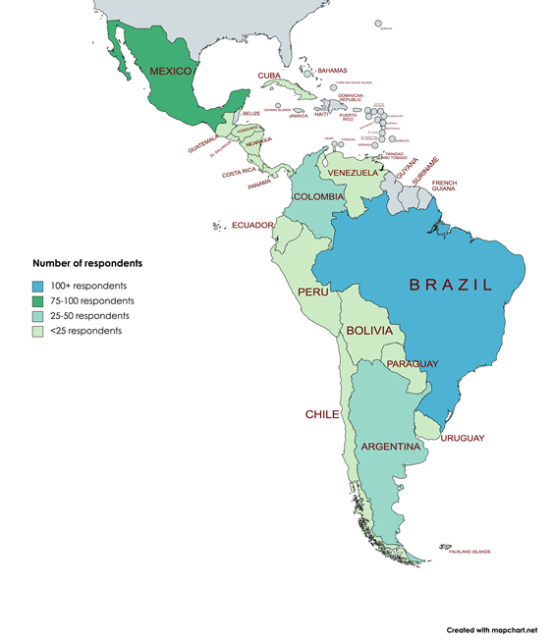




Comments by Hashemi